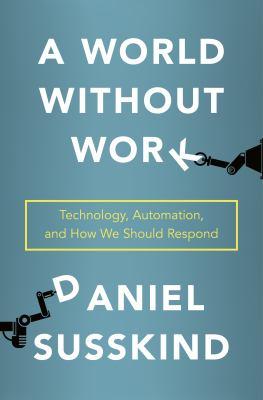
A world without work : technology, automation, and how we should respond
Available Copies by Location
| Location | |
|---|---|
| Community Centre | Available |
Browse Related Items
| Subject |
| Automation > Social aspects. Technology > Social aspects. Social change. |
- ISBN: 9781250173515
- Physical Description x, 305 pages : charts ; 25 cm
- Edition First edition.
- Publisher [Place of publication not identified] : [publisher not identified], 2020.
Content descriptions
| Bibliography, etc. Note: | Includes bibliographical references and index. |
| Formatted Contents Note: | A History of Misplaced Anxiety -- The Age of Labour -- The Pragmatist Revolution -- Underestimating Machines -- Task Encroachment -- Frictional Technological Unemployment -- Structural Technological Unemployment --Technology and Inequality -- Education and Its Limits -- The Big State -- Big Tech -- Meaning and Purpose. |
Additional Information

A World Without Work : Technology, Automation, and How We Should Respond
Click an element below to view details:
Summary
A World Without Work : Technology, Automation, and How We Should Respond
SHORTLISTED FOR THE FINANCIAL TIMES & MCKINSEY 2020 BUSINESS BOOK OF THE YEAR One of Fortune Best Books of the Year One of Inc. Best Business Books of the Year One of The Times (UK) Best Business Books of the Year A New York Times Book Review Editors' Choice From an Oxford economist, a visionary account of how technology will transform the world of work, and what we should do about it From mechanical looms to the combustion engine to the first computers, new technologies have always provoked panic about workers being replaced by machines. For centuries, such fears have been misplaced, and many economists maintain that they remain so today. But as Daniel Susskind demonstrates, this time really is different. Breakthroughs in artificial intelligence mean that all kinds of jobs are increasingly at risk. Drawing on almost a decade of research in the field, Susskind argues that machines no longer need to think like us in order to outperform us, as was once widely believed. As a result, more and more tasks that used to be far beyond the capability of computers - from diagnosing illnesses to drafting legal contracts, from writing news reports to composing music - are coming within their reach. The threat of technological unemployment is now real. This is not necessarily a bad thing, Susskind emphasizes. Technological progress could bring about unprecedented prosperity, solving one of humanity's oldest problems: how to make sure that everyone has enough to live on. The challenges will be to distribute this prosperity fairly, to constrain the burgeoning power of Big Tech, and to provide meaning in a world where work is no longer the center of our lives. Perceptive, pragmatic, and ultimately hopeful, A World Without Work shows the way.


